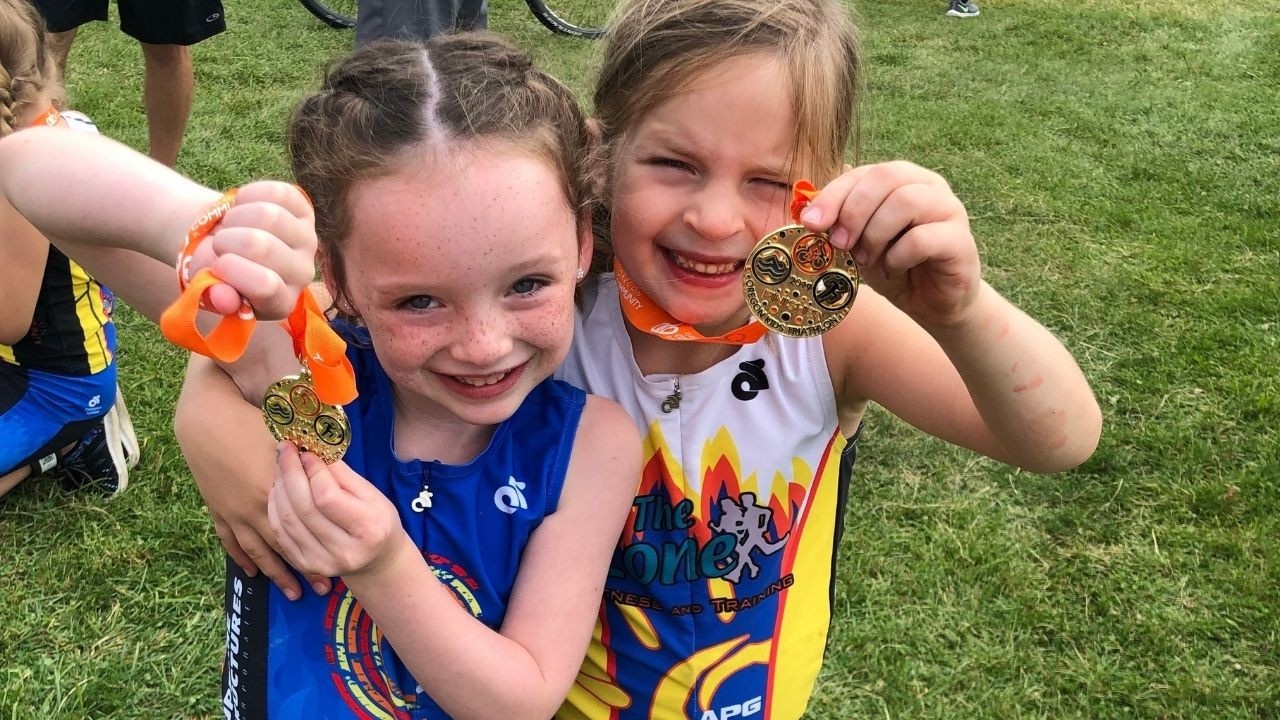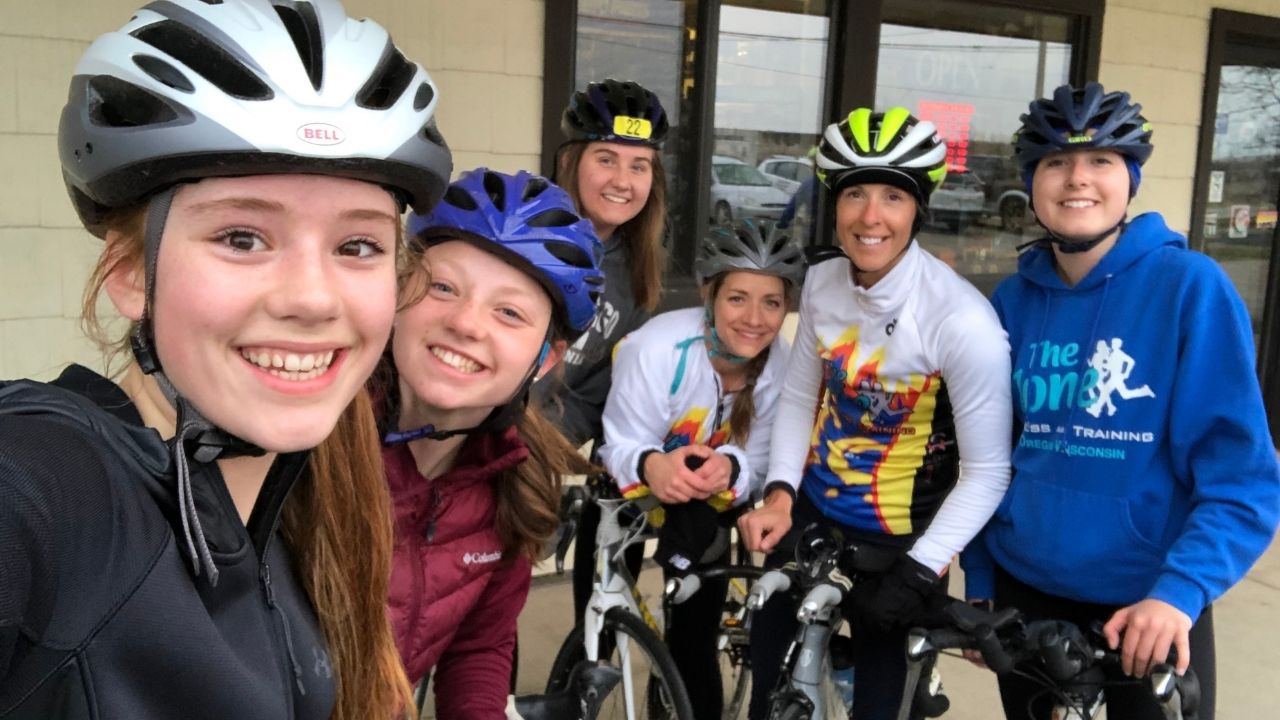
Keeping Girls in Tri
Mar 18, 20221 in 3 girls aged 16-18 are dropping out of sport. Find out why girls are leaving sport & what we can do to keep girls in triathlon.
Text by Miranda Bush, Feisty Triathlon Head Coach & Educator
In addition to being a coach and triathlete, I am a mom to three teenagers – a daughter and two sons. I became a triathlete after having my kids and stayed in the sport for the lessons and connections that far supersede winning. I personally believe that the tools required to successfully navigate the ups and downs of life are parallel to training and racing triathlon: vulnerability, preparation, self awareness, perseverance, courage, and the importance of a community of women to help you continue, even when you want to quit.
I have always been a passionately driven mom and I feel fortunate that my kids have had the opportunity and interest to participate in triathlon, among many other sports, from five years of age. I have witnessed the positive impact that different sports have had on each of them, and it far transcends physical fitness. The life-altering character lessons they have gained include vulnerability, confidence building, work ethic, selflessness, collaboration, joy, personal growth, commitment, compassion, acceptance, teamwork, kindness, and communication.
In addition to physical fitness and the potential character building opportunities, research reviews also show that girls who participate in sports have improved mental health overall, and more often avoid alcohol and illicit drug use. The benefits of participating in a sport also continue into adulthood. According to a 2017 study, out of a sample of 821 high-level women executives, it was found that 90% had played sports. Among women currently holding a C-suite position, this proportion rose to 96%.
Sadly, not only do girls not engage in sports as much as their male counterparts, but young girls are also now leaving sports at an alarming rate. A report released recently from Canadian Women and Sport found that among girls who have participated in sport, one in three leave sport by their late teens. By comparison, the dropout rate for teenage boys aged 16-18 is only one in 10. In addition to being a mom of a teen daughter, I am also an aunt to many young athletic girls around the state of Wisconsin. I have first hand exposure to the fact that young girls are leaving sports.

Why are Girls Leaving Sport?
According to a recent study, girls often quit sport for the following reasons:
- Feel judged (61%)
- Lack of self belief (50%)
- Pressures of schoolwork (41%)
- Don’t feel safe exercising outside (38%)
An underlying cultural narrative heavily influences this way of thinking for girls. The ideas that girls are not as competitive; that sport is not important for girls; that they will never be as good at it compared to boys; and that being good at sports is not feminine, permeate societies. Girls rely heavily on social acceptance and need a safe and inclusive environment to thrive. Girls seek out places to fit in, or belong.
According to another review, girls leave sport after starting menstruation due to fear of leaking, worry that other participants will see their sanitary pads, or due to unmanaged cramps or other symptoms.
What We Can Do to Keep Girls in Triathlon
Ages 5-10
- Keep “training” mostly “play-based fun” while learning about the sport. Create an inclusive and social environment to keep girls engaged.
- Build confidence in skills and routines.
- Focus on teaching them about what their body can “do” rather than how it looks.
- Build a solid foundation through positive encouragement and reinforcement. Let them ask questions and try new methods. If you use shame or come down too hard they risk losing trust in themselves.
- Normalize talking about periods (start now and continue). Seek out or provide education for athletes and parents on the importance of girls maintaining a regular monthly period. Ask coaches to provide a safe space and resource(s) for girls–like a female connected to the program to confide in; and/or a fanny pack with period products in a known area in case of an emergency.
- Understand the signs of Low Energy Availability (LEA) and Relative Energy Deficiency in Sport (RED-S) and how it can affect girls’ overall health and impact sports performance.
Ages 11-13/14
- Maintain the above practices.
- Keep triathlon engaging. If your community does not have a high school club seek out other opportunities for girls to connect with other triathletes.
- Find programs that have intentional functional strength training, including agility and plyometrics for a focus on joint and bone health. During adolescence girls’ bodies change (with their hips widening in addition to hormonal fluctuations). You need to be aware of the risk of injury around ligaments (especially ACL/MCL), and bone overuse (like shin splints). Slow things down to “reteach” girls how to swim, bike, and run through adolescence to prevent injury and build confidence. Help girls understand how their bodies are changing.
- Parents, coaches, and mentors: try to keep in mind how you felt as a teenager. LISTEN, and then be careful and selective with your language. Each girl is unique and can be motivated or pushed away differently.
Ages 15-18 (and beyond)
- Maintain the above.
- Continue with functional training and add in power moves to build strength.
- Be careful to not belittle the importance of the rest of the priorities in their lives (like friends, family, other hobbies, connections, and communities.) Empower young women to make good choices for their physical, mental, and emotional well-being, rather than using threats and/or shame.
At Every Age
- Be and expose them to role models. Expose them to leaders in triathlon– both astounding young women athletes, as well as changemakers who are paving the way for girls. Introduce them to the stories of athletes like Sika Henry, Taylor Knibb, Allysa Seely, and Clarice Lorenzini.
- Remind them that they don’t have to be “good” to stay in the sport. It is very exciting that in 2024 triathlon will likely be an NCAA women’s sport, giving many opportunities to girls and women. BUT, it is also important to stay mindful that most of the time girls quit sports at a young age because they think they are not “good enough.” We can help by being mindful of the language we use to encourage girls in sport.
- Educate ourselves as mentors, coaches and parents. Stay aware of limiters, obstacles, boundaries, and how language can impact girls.
We all can have an impact on encouraging the next generation of girls to stay in sport. Educate yourself and others to keep growing our sport through self discovery and fun, while providing more opportunities for women to succeed in society.

Miranda Bush is the Head Coach and Educator at Feisty Triathlon. She is USA Triathlon and Training Peaks certified, as well as a certified Health Coach. She is also a graduate of Dr. Stacy Sim’s Women Are Not Small Men and Menopause for Athletes courses. As a longtime coach specializing in training women, her passion lies in using lessons from training and racing to teach athletes to evolve physically, mentally, and emotionally through sport. Miranda is also a longtime athlete and multiple Ironman and 70.3 distance podium finisher, maintaining a consistent racing career while working and raising her kids. She resides in Wisconsin with her three teenagers and husband who all love to race triathlon.
Get Feisty Triathlon straight to your inbox
Get the low-down on what's happening in the world of women's triathlon, tips & tricks to crush it on the race course and be the first to know about special offerings from our feisty sponsors.
We hate SPAM. We will never sell your information, for any reason.

